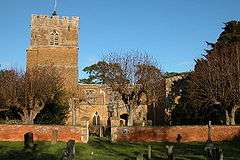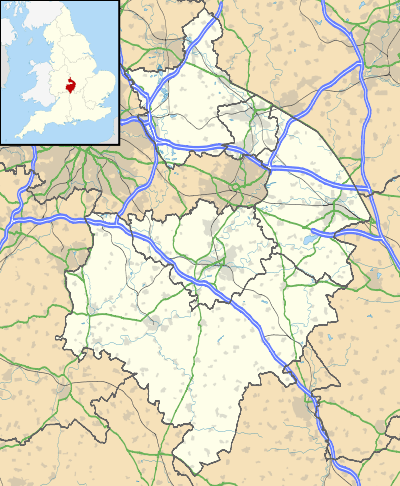Ilmington
Ilmington is a village and civil parish about 3.5 miles (5.6 km) north-west of Shipston-on-Stour and 8 miles (13 km) south of Stratford-upon-Avon[1] in the Cotswolds (Area of Outstanding Natural Beauty) in Warwickshire, England. The population of the civil parish taken at the 2011 census was 712.[2] Ilmington is the highest village in Warwickshire[3] and is at the foot of the Ilmington Downs, which is the highest point in Warwickshire. Residents are called "Ilmingtonians".
| Ilmington | |
|---|---|
 St Mary the Virgin parish church | |
 Ilmington Location within Warwickshire | |
| Population | 712 (2011 Census) |
| OS grid reference | SP211435 |
| Civil parish |
|
| District |
|
| Shire county | |
| Region | |
| Country | England |
| Sovereign state | United Kingdom |
| Post town | Shipston-on-Stour |
| Postcode district | CV36 |
| Dialling code | 01608 |
| Police | Warwickshire |
| Fire | Warwickshire |
| Ambulance | West Midlands |
| Website | Ilmington – A Cotswold Village |
History
In the 10th century the village's toponym was Ylmandunes in Old English. This evolved into Elmington because it had many elm trees. When Dutch Elm Disease came to England it killed the trees and now none remains in the village.
The Elizabethan poet Sir Thomas Overbury was born at Compton Scorpion Manor, just south of the village.[1]
In 1934 the Royal Christmas Message broadcast by King George V was relayed worldwide from Ilmington Manor, home of the Flower family, and introduced by 65-year-old Walton Handy, a local shepherd, with carols from the church choir and bell ringing from the church.
The early 18th-century Grade II* listed Foxcote House stands in the village. The house was the seat of the Canning family for many years, it is presently owned by the American lingerie billionaire Les Wexner.[4][5]
Parish church
The Church of England parish church of St Mary the Virgin is Norman and dates from about the middle of the 12th century.[6] Its bell tower has five bells cast by Henry Bagley of Chacombe in 1641,[6] plus three later bells added to make the present ring of eight. The Church of England parish is now part of a single benefice with the parishes of Tredington with Darlingscott Preston-on-Stour, Stretton-on-Fosse and Whitchurch.[7] It cannot be directly accessed by road but instead by a pathway.[8]
Robert Thompson
Robert (Mousey) Thompson of Kilburn carved the pulpit and pews for the church. He also carved his signature mice in eleven places throughout the church.
The Apple Map and June Hobson
June Hobson was a gardener and artist who lived in the village. She inspired villagers to embroider the map that is a copy of old maps which showed where all of the orchards in the village were. It shows that there were an unusually large number of small orchards in the village. The Apple Map is displayed in the village church. Ilmington Apple Day starts with guided viewing of the Apple Map in the church before a search for some of the 38 different apple varieties grown in the village. Many people come to the Apple Days which celebrate the history of the small orchards in the village. The children at the local school devised the apple walk.
Amenities
Ilmington has a Church of England primary school.[9] It has a village hall, village shop and Post Office sharing the same building.[10] Ilmington Revolution Football Club plays on Ilmington playing field. Ilmington has a Cotswold Morris dancing side.[11]
Ilmington has two public houses, The Howard Arms (a gastropub) and The Red Lion (Hook Norton Brewery).[12]
The Fifties, Ilmington Remembers
A year-long project began in 2012 recording the memories of people who lived in Ilmington during the 1950s. These oral histories then provided the material for the creation of a play about village life in those days and the impact that events of national significance had on people's lives.
This original piece of theatre coincided with the four-day countrywide celebrations to mark the Diamond Jubilee of Elizabeth II in June 2012. It was performed by actors from the village and was shared with audiences from the local community.
The project, funded by the Heritage Lottery Fund, has a website[13] that includes a series of recordings from the village's 50s residents.[14]
Notable residents
- Dorothy Hodgkin, Nobel prize winner
References
- "Literary Connections – Ilmington". Archived from the original on 29 December 2006.
- "Civil Parish population 2011". Retrieved 29 December 2015.
- Anonymous 2003, p. 66.
- Historic England. "Foxcite House (1024118)". National Heritage List for England. Retrieved 11 November 2015.
- Adam Luck and Robert Mendick (24 October 2015). "Billionaire tycoon behind Victoria's Secret 'keeps his multi-million Cotswolds estate away from prying eyes'". The Telegraph. Retrieved 11 November 2015.
- Salzman 1949, pp. 98–103
- Archbishops' Council. "Ilmington – St. Mary, Ilmington". A Church Near You. Church of England.
- "A guide to Ilmington". Information Britain.
- Ilmington C of E Primary School
- "Ilmington Community Shop & Cafe, Cotswolds". Ilmington Community Shop & Cafe. Retrieved 9 August 2017.
- Traditional Ilmington Morris Men
- "The Red Lion in Ilmington". Find A Hook Norton Pub. Hook Norton Brewery. 2013. Archived from the original on 23 September 2015. Retrieved 4 June 2013.
- Fabulous Fifties
- Oral Histories
Sources and further reading
- Anonymous (2003). 50 Walks in Warwickshire & the West Midlands. Basingstoke: AA Publishing. p. 66. ISBN 0-7495-3629-2.CS1 maint: ref=harv (link)
- Pevsner, Nikolaus; Wedgwood, Alexandra (1966). Warwickshire. The Buildings of England. Harmondsworth: Penguin Books. pp. 316–317.CS1 maint: ref=harv (link)
- Salzman, LF, ed. (1949). Victoria County History: A History of the County of Warwick, Volume 5: Kington Hundred. pp. 98–103.CS1 maint: ref=harv (link)
External links
| Wikimedia Commons has media related to Ilmington. |
- Ilmington map
- Photos of Ilmington and surrounding area on geograph
- Fabulous Fifties – Ilmington Remembers
- Ilmington Village Hall
